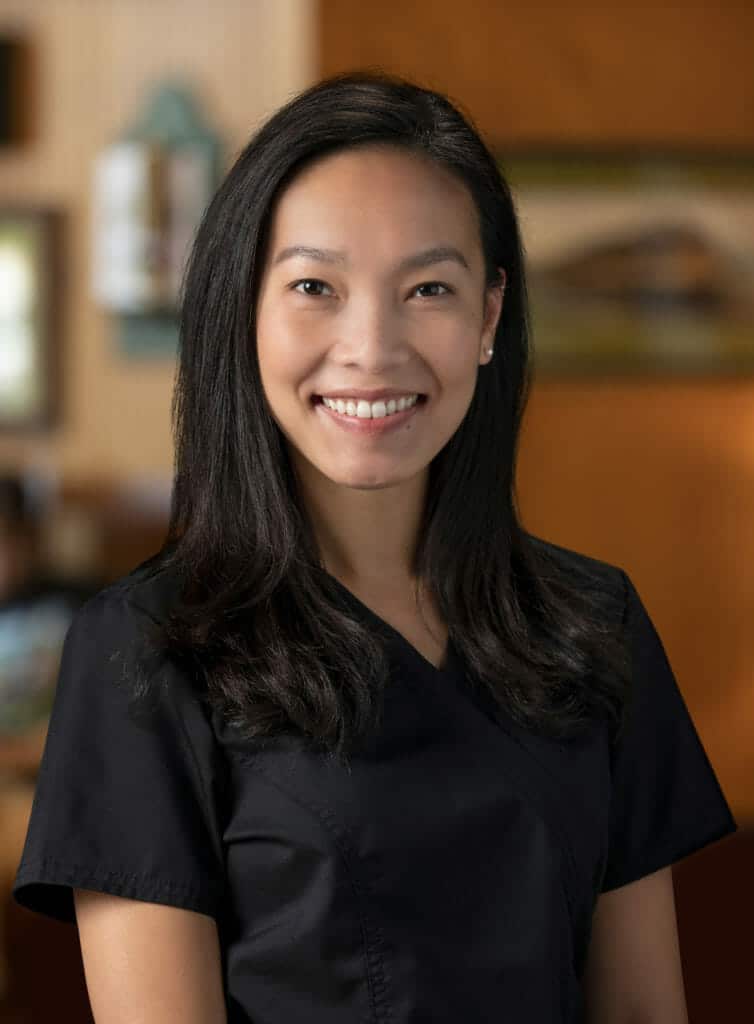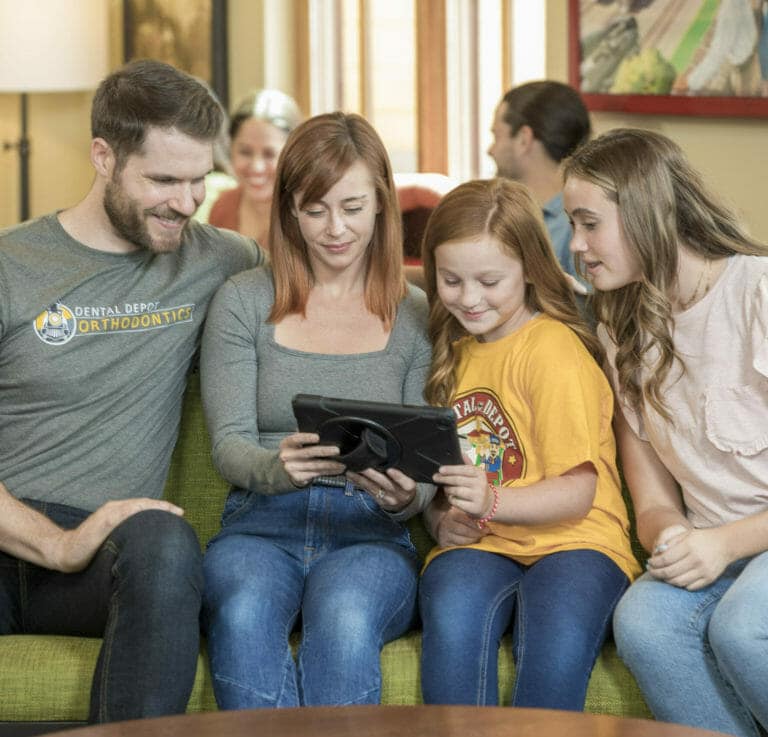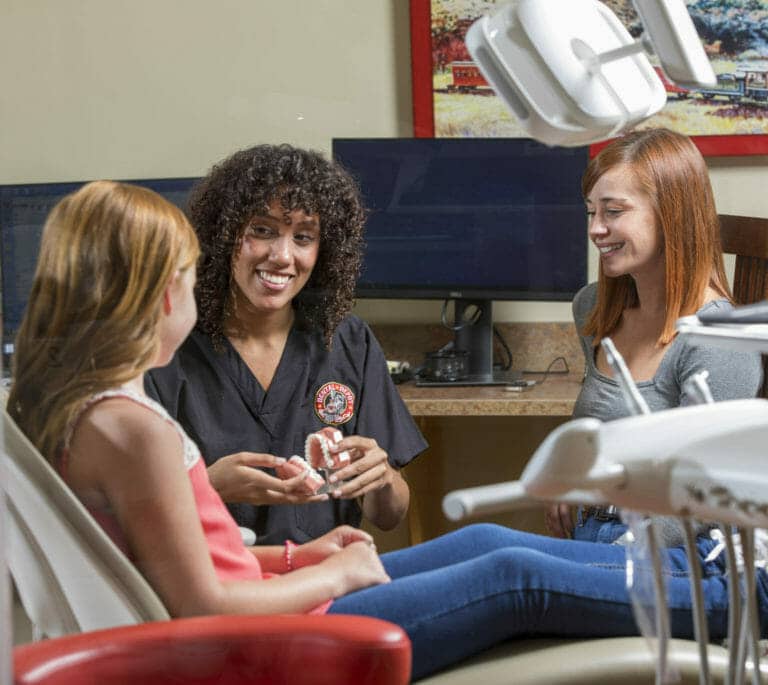
Last September Dental Depot Orthodontics North OKC welcomed a new orthodontist to the team! Dr. Mychi “N” Nguyen comes to us from sunny Southern California and graduated Magna Cum Laude from the University of California, Irvine. Dr. N then completed dental school at the University of California, San Francisco, before completing her orthodontic residency at New York University. A self-described nomad, we count ourselves lucky that Dr. N has settled down here in Oklahoma.
To prepare for National Children’s Dental Health Month, Dr. N sat down with us to talk about what parents need to know in order to get their child on the right track for orthodontics and what to expect along the way.
DD: I know that you’re pretty passionate about early treatment. Can you walk me through what parents and guardians should be looking for as their child gets ready to go into orthodontics?
MN: So I tend to treat only as needed, I like to minimize the amount of time patients are spending in treatment. However, I do like to start seeing patients as early as age seven, that way if there’s anything that we need to intervene with and treat early, we can. With some things, such as crossbites, it’s easier to treat when they’re younger and that can prevent them from having extended treatment times when they’re older. Another thing that we look out for is insufficient space for permanent teeth to come in. If we give them an expander when they’re younger, it’ll give the permanent teeth a better chance of having space to come in. And so I’m looking for all of that as young as age seven. If everything is going well, we’ll just continue to see them every six months or every year just to make sure that their growth is going well and that the teeth are coming in nicely.
DD: Do you find that most parents do bring their children in for that initial consultation at age seven?
MN: I do, yeah. And that’s one of the nice things about working here, we have Dr. Vu and Dr. Salous just down the hallway, and they’re really good about sending those patients down here to us for their consultations. Mostly it’s to make sure everything is fine and if there is early treatment, we can get started.
DD: What can parents typically expect at that consultation?
MN: It’s typically a really quick and easy appointment, usually less than 20 minutes. It’s me coming in and taking a look at the child and the x-rays, just to make sure everything is going well. If they’re missing baby teeth early, for example, we want to put a space maintainer in to reserve a spot for their permanent teeth to come through. During the appointment, I like to explain to them what’s going on in their child’s mouth and what we can expect in terms of growth or complications.

DD: How far ahead can you forecast how that smile is going to develop?
MN: It’s rapidly changing as they grow and that’s why we’ll have them back every six months after that initial visit. That way we can continue to monitor any changes.
DD: Circling back to the space maintainers and expanders, what other phase-one treatment options might parents see?
MN: I’m a big fan of the face masks, actually. One of the hardest skeletal developments that patients sometimes have is what we call a class three, which means the mandible – the lower jaw – is growing more quickly than the upper jaw. In those cases, we can actually prevent the need for the patient to have surgery in the future if we can get in there and help their upper jaw along. For those treatments, I do tend to start earlier. Around age eight or nine is when I’d like to start using a face mask to help move the upper jaw forward.
Another thing we might do is limited braces, where we might have braces just on the top four teeth and the back molars, and that way if the patient has a cross-bite, we can draw that cross-bite more forward so that the rest of the teeth can come in more naturally and they aren’t damaging their teeth. That is another concern – if they’re in a cross-bite and those lower teeth start to come forward, you can see recession and they can start to lose bone around those teeth.
DD: What is the relationship like between orthodontists and general dentists here?
MN: It’s actually very convenient here! Since Dr. Salous and Dr. Vu are just down the hall, I think our offices are a huge benefit to our patients. It’s been great working with them because patients are able to walk down here after their cleaning for a consultation or if I’m doing an orthodontic adjustment and notice a cavity, I can take the wire and bracket off and send them over for that filling. Even for regular cleanings, they can stop by here before and we’ll take their archwire out so they get a better cleaning.

DD: What are some of the things that you want parents to know? What should their expectations be throughout the orthodontic process for their child?
MN: First of all, it’s so important for patients to bring their children in just for that evaluation early – it doesn’t necessarily have to be braces right then – there are things that we can see early, including behavioral concerns. For example, if we notice the patient is sucking their thumb a lot, they can end up with an open bite, but it can close on its own if that behavior is removed from the equation. I would want parents to know that even if we don’t start treatment, it’s important for us to be able to monitor that development.
Once we do decide to start treatment, I want to make sure parents understand that they’re going to be involved with their child’s braces. It’s harder to keep teeth clean with braces and their child’s oral hygiene might suffer if the parents aren’t staying on top of them. One of the biggest things we need parents to help with is making sure that patients are wearing rubber bands (if they have those). We also rely on parents bringing their children to their appointments regularly. Patients also need to have access to the right foods and avoid things that aren’t good for their braces. The general rule of thumb is to avoid anything that’s super, super sticky, or really, really hard.
DD: How often will parents need to bring their child in for those routine appointments through treatment for braces versus Invisalign?
MN: So with Invisalign, it’s a little more spread out. I like to check-in and make sure everything is going well, but I typically see them every two to three months. With patients in braces, I see them every six to eight weeks.
DD: Lastly, what do parents need to know about retainer wear after orthodontic treatment is completed?
MN: So I would say that the most important part of orthodontic treatment is the retainer. It’s so underrated when we tell patients they have to wear it, they’ll ask, “My teeth are already straight. I don’t need to wear that,” and they don’t realize how crucial it is because all of their hard work can be gone. If they don’t wear a retainer, their teeth can relapse, become crooked, or even go back to how they were. When we’re doing orthodontics on permanent teeth, they’ll need to wear one after. And we have different ones, bonded and removable. The bonded ones are those little bars that go behind the teeth and I only reserve it for very severe crowding cases. We mostly use the clear, removable ones and for most patients, I have them wear full-time for a month, and after that I switch them to decreased and eventually nighttime-only wear.
Teeth have what are basically memory fibers around them, almost like a rubber band. You can move them a certain way and the rubber stretches, but it still wants to rotate back to how it was before. Over time, the longer they’ve been wearing their retainers, the rubber bands weaken and the tooth becomes less likely to relapse. So we have kiddos who finish treatment and they’re really good about wearing their retainers, then they’re less likely to relapse as adults even if they lose their retainers. But within the first two years after treatment, they definitely need to see their orthodontist to replace a lost retainer as quickly as possible.
If you’re ready to schedule your child’s free orthodontic consultation with Dr. N or any of our Dental Depot orthodontists, you can request an appointment online. Dr. N is accepting new patients and our offices offer a variety of convenient payment options to help you get the smile you want. Want to learn more about Dr. N? Visit her bio here!
